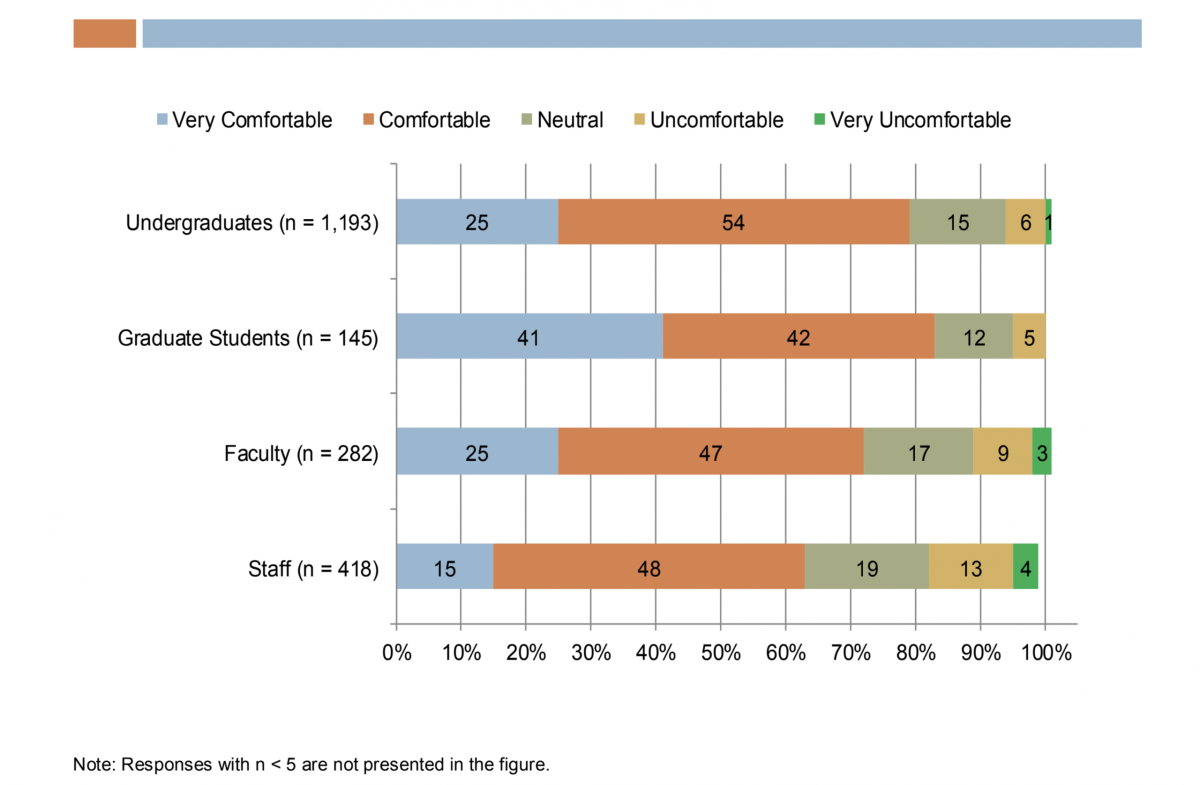The Women’s Leadership Initiative (WLI) hosted an open discussion about the St. Joe’s Campus Climate Study on Nov. 13.
During the first part of the meeting, data was presented from the Campus Climate Study, a survey sent out to students, faculty and staff in 2017 with questions about inclusion, diversity and equity on campus. This anonymous survey asked respondents questions about their experiences on topics such as sexual assault, racism and LGBTQIA+ inclusion.
Kelsey Welsh ’22, co-director of campus relations for WLI and facilitator of the discussion, said WLI hosted this event in response to the University Forum, the administration’s response to recent racial bias incidents on campus.
“Everyone was under the premise that the University Forum would be more like BSU’s [Black Student Union’s] forum last year where everyone had the free chance to speak,” Welsh said. “[The University Forum] was more like an assembly. I wanted to create that space where everyone could have that platform to speak and be comfortable.”
The “Making a More Inclusive SJU” event was co-hosted by the African-Caribbean Student Association, Bridging the Gap, Black Student Union (BSU), Latino Student Association and University Student Senate (USS).
After the presentation, Welsh opened the meeting for anyone to share their thoughts and experiences related to these topics, as well as ideas for solutions to campus climate problems.
Silvino Alexander ’22 said during the discussion that one way to improve inclusion and diversity on campus would be to provide direct information to students about racial bias incidents. Alexander suggested this communication be in the form of a “student network” rather than coming from the administration.
“I’m a student of color and if I feel uncomfortable, I’m not going to continue my time here, so if we really want diversity on campus, we need to make a place where people feel comfortable to not only go here, but stay here,” Alexander said.
Destiny Little ’23 also emphasized the importance of students communicating by speaking up when they hear others saying microaggressions that create an unwelcoming campus climate.
“I really think you should be able to hold your friends accountable and also yourself accountable,” Little said. “You can’t claim that you are an ally but don’t act on it.”
To further promote the idea of accountability, Julia McQuade ’20, vice president of USS, said she hopes to actualize the USS action plan they wrote after the Climate Study to promote inclusion and diversity on campus.
“[The action plan is] a really good start to voice general concerns,” McQuade said. “We know we need to continue conversations, we know we need to hold each other accountable, we know we need to have more events and educational opportunities.”
McQuade said USS wants to promote students’ interests by creating concrete plans. However, McQuade said they will need the support of the university to put those ideas into action.
“I think there’s a power in putting your money where your mouth is,” McQuade said. “So if the university really does prioritize this, how are they supporting the groups that are fighting for it and how are they taking some of that burden off of those groups onto the university on other people on allies and supporting them that way?”
For Welsh, the responsibility to improve campus climate now lies with the students.
“We need university mandated action which is absolutely true, but they’re not going to know exactly what to do and how to do it if we don’t take action first and hold them accountable,” Welsh said. “It does start with us. If they’re just making decisions on our behalf without our voices being heard, what is that?”
Cara Smith ’21 contributed to this story.














































